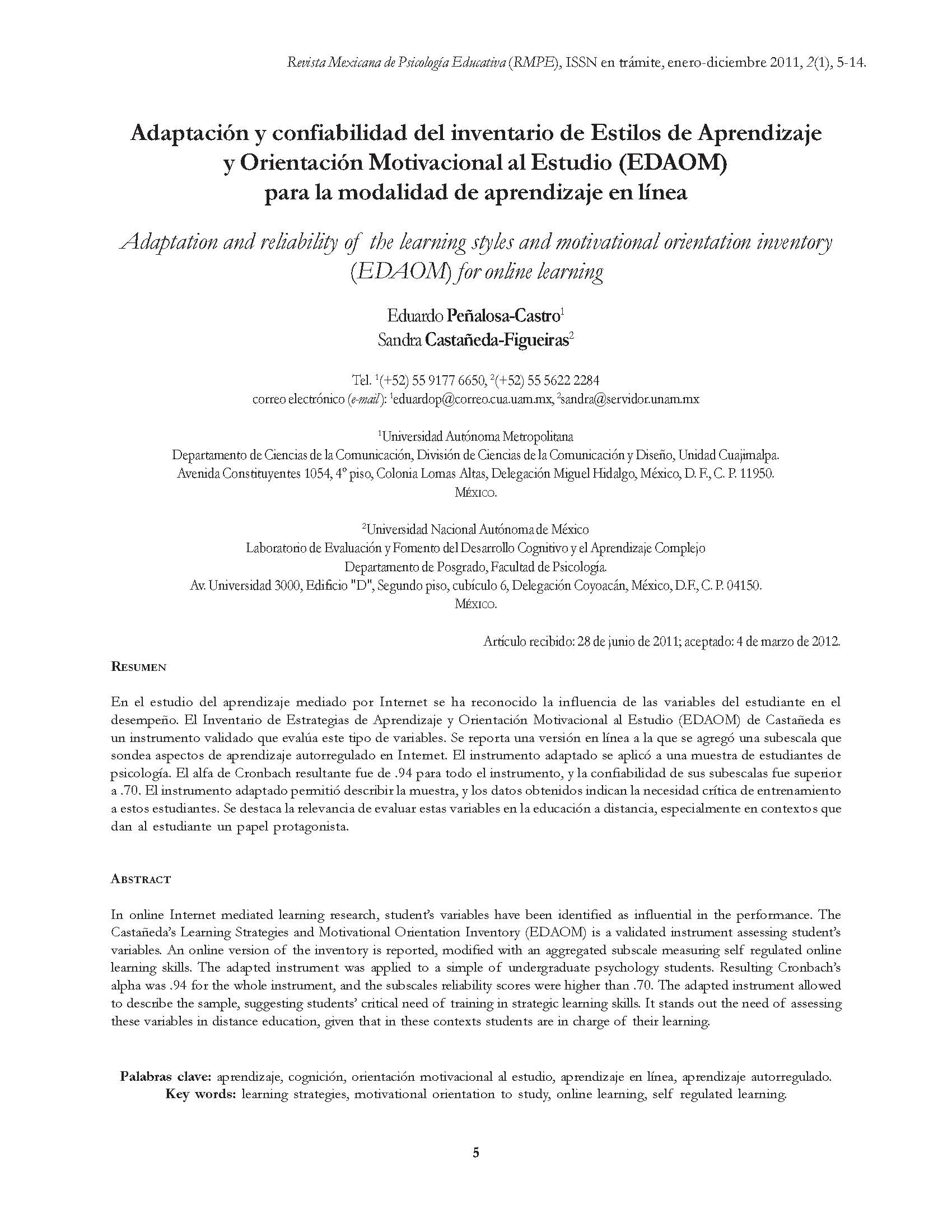Resumen
En el estudio del aprendizaje mediado por Internet se ha reconocido la influencia de las variables del estudiante en el desempeño. El Inventario de Estrategias de Aprendizaje y Orientación Motivacional al Estudio (EDAOM) de Castañeda es un instrumento validado que evalúa este tipo de variables. Se reporta una versión en línea a la que se agregó una subescala que sondea aspectos de aprendizaje autorregulado en Internet. El instrumento adaptado se aplicó a una muestra de estudiantes de psicología. El alfa de Cronbach resultante fue de .94 para todo el instrumento, y la confiabilidad de sus subescalas fue superior a .70. El instrumento adaptado permitió describir la muestra, y los datos obtenidos indican la necesidad crítica de entrenamiento a estos estudiantes. Se destaca la relevancia de evaluar estas variables en la educación a distancia, especialmente en contextos que dan al estudiante un papel protagonista.
Citas
Azevedo, R. y Cromley, J.G. (2004). Does training on self regulated learning facilitate students' learning with hypermedia? Journal of Educational Psychology, 96, 523-535. Carroll, C. A. y Garavalia, L.S. (2002). Gender and racial differences in select determinants of student success. American Journal
of Pharmaceutical Education, 66, 382-387.
Castañeda, S. y López, M. (1989). Antología. La psicología cognoscitiva del aprendizaje: Aprendiendo a aprender. México,
UNAM.
Castañeda, S. y Ortega, I. (2004). Evaluación de estrategias de aprendizaje y orientación motivacional al estudio. En S. Castañeda (Ed). Educación, aprendizaje y cognición: teoría en la práctica. México, Manual Moderno, pp. 277-299.
DeBord, K. A.; Aruguete, M.S., Y Muhlig, J. (2004). Are computer-assisted teaching methods effective? Teaching of Psychology, 27(4), 65-68.
Dembo, M. H., Junge, L., y Lynch, R. (2006). Becoming a self-regulated learner: Implications for Web-based education. En H. F. O'Neil, y S. R. Perez (Eds.), Web- based learning: Theory, research, and practice (pp. 185-202). Mahwah, NJ: Erlbaum.
Glaser, R. (1996). Changing the agency for learning: Acquiring expert performance. En K. A. Ericsson (Ed). The road to excellence: The acquisition of expert performance in the arts and sciences, sports and games (pp. 303-311). Hillsdale, NJ: Lawrence Erlbaum.
Glaser, R., y Baxter, G.P. (2000) Assessing active knowledge. CRESST, University of Pittsburgh. http://www. cse.ucla.edu/CRESST/Reports/TECH516.PDF
Kinney, N. (2001) A guide to design in testing in online psychology courses. Psychology Learning and Teaching, 1, 16-20.
Körndle, H., Narciss, S., y Proske, A. (2002). Promoting self- regulated learning in web-based learning environments. En:
H. Niegemann, R. Brucken y D. Leutner (Eds.), Instructional design for multimedia learning. Munster: Waxmann.
Ley, K. (2004). Motivating the distant learner to be a self-directed learner. 20th Annual Conference on Distance Learning and Teaching, Universidad de Wisconsin, EUA.
Ley, K., y Young, D.B. (2001). Instructional principles of self regulation. Educational Technology Reserarch & Development, 49, 93-103.
Lynch, R., y Dembo, M. (2004) The Relationship Between Self- Regulation and Online Learning in a Blended Learning Context. Recuperadode: http://www.irrodl.org/content/v5.2/ lynch-dembo.html
Maki, M. R. H., y Maki, W. S. (2000b). Evaluation of web- based introductory psychology course: II. Contingency management to increase use of on-line study aids. Behavior, Research Methods, Instruments and Computers, 32(2), 230-239. Maki, M. R. H. y Maki, W. S. (2000a). Mastery quizzes on the Web: results form a Web-based introductory psychology course. Behavior, Research Methods, Instruments and Computers,
( 2), 212-216.
Maki, M. R. H., Maki, W. S., Patterson, M., y Whittaker, P. D. (2000). Evaluation of web-based introductory psychology course: I. Learning and satisfaction in on-line versus lecture courses. Behavior, Research Methods, Instruments and Computers, 32, 230-239.
Peñalosa, E., y Castañeda, S. (2007). Meta-Tutor: construcción, descripción y aplicación de un ambiente de aprendizaje para Internet, Revista Latinoamericana de Tecnología Educativa,
(1), 97-127. Recuperado de http://campusvirtual. unex.es/cala/editio/
Peñalosa, E., y Castañeda, S. (2008a). Generación de conocimiento en la educación en línea: un modelo para el fomento de aprendizaje activo y autorregulado, Revista Mexicana de Investigación Educativa, 13(36), 229-260.
Peñalosa, E., y Castañeda, S. (2008b). Meta-Tutor: an online environment for knowledge construction and self- regulated learning in clinical psychology teaching. International Journal of Continuing Education, Engineering and Lifelong Learning, 18(3), 283-297.
Pintrich, P. R. (2000). The role of goal orientation in self- regulated learning. En: M. Bokaerts, P. Pintrich y M. Zeidner (Eds.), Handbook of self-regulation. San Diego, Academic Press, 451-502.
Pintrich, P. R. ,y De Groot, E. V. (1990). Motivational and self- regulated learning components of classroom academic performance. Journal of Educational Psychology, 33-40.
Pintrich, P. R., Smith, D. A., García, T., y McKeachie, W.J. (1991). Reliability and Predictive Validity of the Motivated Strategies for Learning Questionnaire (MSLQ), Educational and Psychological Measurement, 53, 801-813.
Poirier, C. R., y Feldman, R. S. (2004). Teaching in cyberspace: online versus traditional instruction using a waiting-list experimental design. Teaching of Psychology, 31(1), 59-62. Torrano, F. y Gonzalez, M.C. (2004). El aprendizaje autorregulado: presente y futuro de la investigación. Revista electrónica de investigación psicoeducativa, 3(2), Recuperado
de: http://www.investigacion-psicopedagogica.org/ revista/articulos/3/espannol/Art_3_27.pdf
Waschull, S. B. (2001). The online delivery of psychology courses: attrition, performance, and evaluation. Teaching of Psychology, 28(2), 143-147.
Weinstein, C. E., Powdrill, L., Husman, J., Roska, L. A., y Dierking, D. (1998). Aprendizaje estratégico: un modelo conceptual, instruccional y de evaluación, en: S. Castañeda (Ed). Evaluación y fomento del desarrollo intelectual en la enseñanza de ciencias, artes y técnicas (pp. 197-228). México, UNAM-Conacyt-Porrúa.
Winne, P. H., y Perry, N. E. (2000). Measuring self-regulated learning. En: M. Noekaerts, P. Pintrich y M. Zeidner (eds): Handbook of self-regulation, pp. 531-566. San Diego, Ca., Academic Press.

Esta obra está bajo una licencia internacional Creative Commons Atribución-NoComercial-SinDerivadas 4.0.
Derechos de autor 2024 Universidad Nacional Autónoma de México


